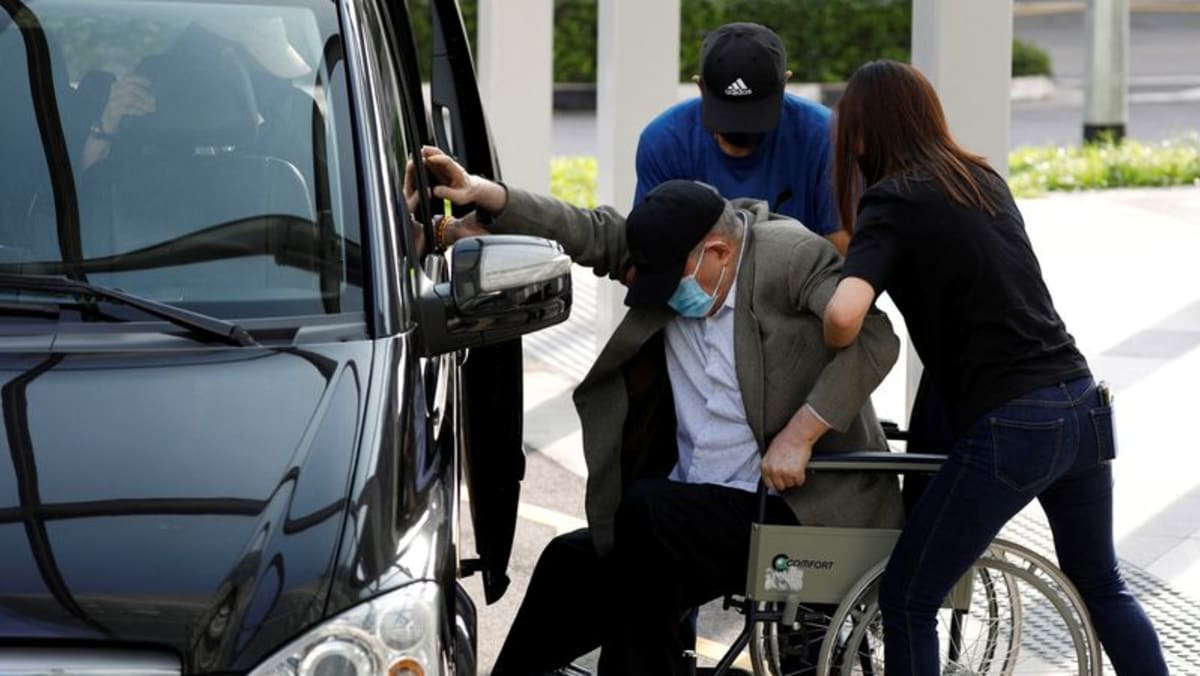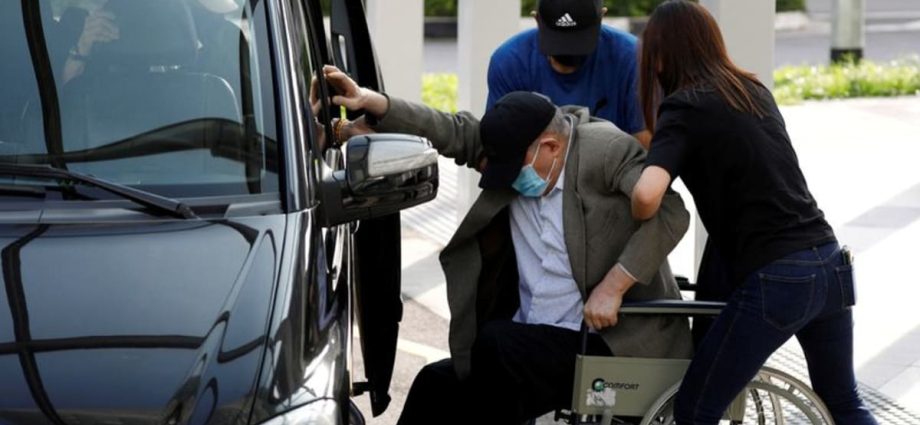
SINGAPORE: The founder of oil trading firm Hin Leong Trading took the stand at the opening of his defence’s case on Monday (Oct 30), sharing in halting language about how he came to helm the oil empire and his involvement in the later years, before it collapsed.
Lim Oon Kuin, better known as OK Lim, is on trial for three criminal charges: Two counts of cheating the Hongkong and Shanghai Banking Corporation (HSBC) and one count of instigating a contracts executive of Hin Leong Trading to forge a false record. The charges involve US$111.7 million (S$148.7 million).
The 81-year-old testified slowly in a wheelchair, through a Mandarin interpreter. He stumbled over the words of the oath when he was being led to recite it, and needed to see the words on a document before he could read them aloud.
Before he began testifying, his lawyer, Senior Counsel Davinder Singh, said his team might need to take instructions from Lim from time to time as Lim is also a defendant in two civil cases.
On the first day of his testimony, the defence delved into Lim’s personal background and his role at Hin Leong.
Responding to questions from his other lawyer, Mr Navin Thevar, Lim said he was born in 1942 in Putian village in China’s Fujian province.
He went to a primary school in Singapore for three years and stopped studying after Secondary 2 because of “difficulties at home”. His father, a fisherman who has seven children, did not earn enough to pay for school fees.
Lim spoke Mandarin, Hokkien, a bit of Teochew, some Putian dialect and only very simple English.
He said he had followed his father in his work as a fisherman.
“Our fishing boat, we took the Cambodia and Sarawak route,” said Lim. “We would make two trips to and fro every month. One time there was a storm at sea. Our fishing boat nearly sank. My father then said – you all don’t do this anymore, go look for other jobs.”
He first began working for a supplier who provided oil to his father’s fishing boat, and began taking up jobs in this business.
After working for the oil supplier for two to three years, Lim set up a small company called Hin Leong with his parents and family members.
The company supplied oil to the fishing boats and to the “kampungs” or villages.
“At that time, the power generators, they used diesel. We also supplied to delivery firms and factories,” said Lim.
“We worked hard. We worked day and night to supply oil to them. Because of our good service, they referred other clients to buy oil from us, so our business grew and became better,” he said.
After that, the family set up multiple related companies for various purposes including dealing with oil storage, holding ships or managing and renting them out and supplying bunker to ships.
Explaining the family business, Lim said: “These companies are owned by our families, so it’s like, sometimes if one company needs anything, the other will help. For example, if one company needs funds, the other company will then send the funds over. It is like our left pocket and right pocket. It’s a family business.”
His two children were also shareholders at Hin Leong.
Lim said he stopped being managing director of Hin Leong and all other firms either in March or April 2020, “when something happened at Hin Leong”.
He added that he had already “slowed down” from around 2010 due to age.
“At that time, I was already 70 plus. Physically, I was not like before. Not like when I was young, so I slowed down. I only went to work (in the) afternoon and I gradually handed over the work to the team of people I trusted,” he said.
He also had a spinal problem that stemmed from an injury in his younger days when he carried “heavy things”. As he aged, he had to undergo surgery for the issue.
“Because I continued working after the spine surgery, subsequently, my legs and hips became weak. I could not stand for too long, for example at a buffet. My legs would ache, and I cannot handle slopes,” he said.
On questioning by his lawyer, Lim said did not know how to use a computer, not even how to turn it on or off.
He did not know how to use a phone other than for making calls, and the contacts were usually preloaded into his device by other people.
He also said he did not know how to use emails or photocopy documents. There were always other people who would perform these tasks for him, he said.
As for filling out partially printed forms, he said he could fill in only simple terms such as his name, age and IC number.
Usually, he would make phone calls if he had to communicate with anyone at work, he said.
From 2010 onwards, he said he did more “strategic work” and some new business development for Hin Leong. He would also handle old customers or those who spoke Mandarin, or those who looked for him specifically.
He said there were different departments and teams, such as bunkering, land sales, international trade and contracts, and they each had their own head.
Each department would work with their own team to complete their work and liaise with other departments, and the heads of each department would inform Lim only if there were “some very important matters”.
On his personal assistant Ms Serene Seng, who had testified against him as a prosecution witness, Lim said she had been with Hin Leong for over 20 years.
She initially joined as secretary to his deputy, but when his deputy died suddenly from a brain haemorrhage, she became Lim’s assistant.
He described Ms Seng’s wide-ranging role as his personal assistant, handling all tasks requiring English, interpreting at meals with the senior management of banks, as well as interpreting business negotiations in both English and Mandarin.
She later became Hin Leong’s head of contracts and corporate affairs manager.
Asked why, Lim said she needed a title so the clients would know what she does.
Describing her work as his personal assistant, Lim said: “She is very responsible, diligent and intelligent. And there are some things that, what we Chinese call – ‘ju yi fan san’ – she is very flexible. She knows how to handle the situation.”
The trial continues.

